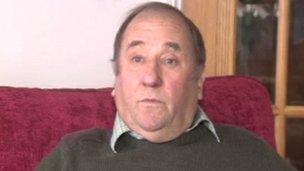Anglesey election: Plaid to seek Labour council deal
- Published
Plaid Cymru celebrated an increase in representation
Plaid Cymru says it will seek a deal with Labour to run Anglesey council after elections failed to give any group overall control.
Independents won the biggest number of seats - 14 out of 30 - but Plaid hailed its 12 seats as an "excellent" result.
Labour won three seats and the Liberal Democrats one.
The election was postponed by a year while the authority was run by Welsh government-appointed commissioners.
Plaid Cymru party leader Leanne Wood said: "This is an excellent result for Plaid Cymru.
"Winning 12 seats on the council and increasing our representation on the council is a definite sign that we are winning support up and down the country with our positive policies to boost the economy."
Plaid Cymru councillors met on Friday night and elected Bob Parry as their group leader.
In a statement the group said it would open discussions with Labour in order to try and form a coalition.
Between them the two parties have half of the council's 30 seats, cut from 40 since the last election in 2008.
There have been big boundary changes and 11 new multi-member wards have been created.
Voters in the rest of Wales elected new councils in May 2012, but the poll on Anglesey was postponed while commissioners were tasked with bringing about "democratic renewal" of the troubled authority.
Turnout across the island was 50.5% - higher than the Welsh average at the 2012 council elections, but lower than Anglesey's last local elections in 2008.
Local Plaid AM Ieuan Wyn Jones said although there were still a lot of independent councillors "I think their power has been broken".

Bryan Owen, an independent former leader of Anglesey council, lost his seat
"We have really seen a sea change in this election," he said.
"The new council will be determined I think to make sure that the services provided here are things that people want across the island."
He said it would be difficult for his party to form a pact with independents, adding: "Political parties have a responsibility to deliver."
Former council leader Bryan Owen was beaten by a Plaid clean sweep in the Canolbarth Mon ward.
Speaking to BBC Wales, he was asked if he thought the election had been set up to get rid of the independents who have dominated politics on the island.
"There's no doubt about it," he said. "There's been some gerrymandering [manipulation of ward boundaries] to be honest with you and I believe that it's been done to favour the political parties."
He said that he was unlikely to stand again, but that the authority had made big improvements and had a "bright future ahead of it".
Independent Jeffrey Evans, who was elected in the Ynys Gybi ward, said he hoped any deal making to form an administration was done "with honesty, dignity and respect".
UKIP, which fielded candidates in all wards, won a 7% share of the vote - bigger than the Conservatives' 6%. Neither party won any seats.
It reflects an improved performance by UKIP at local elections across England.
Ministers intervened in Anglesey after years of political infighting.
Commissioners were appointed to run the council in 2011 when a damning report said previous attempts to sort out problems had not found a lasting solution.
The election was postponed by a year while the authority was run by Welsh government-appointed commissioners
The report by the auditor general recommended a programme of "democratic renewal" and a review of electoral arrangements.
As part of a new election system, councillors were chosen in 11 multi-member wards where people had two or three votes.
There were 106 candidates standing for election.
Returning officer Richard Parry Jones, the council's chief executive, has said the high number of candidates and competition for seats in the new wards was a sign that democracy on the island had been "reinvigorated".
In 2004, 14 of the then 40 seats available were uncontested. In 2008, seven seats were uncontested.
- Published29 April 2013
- Published3 May 2013